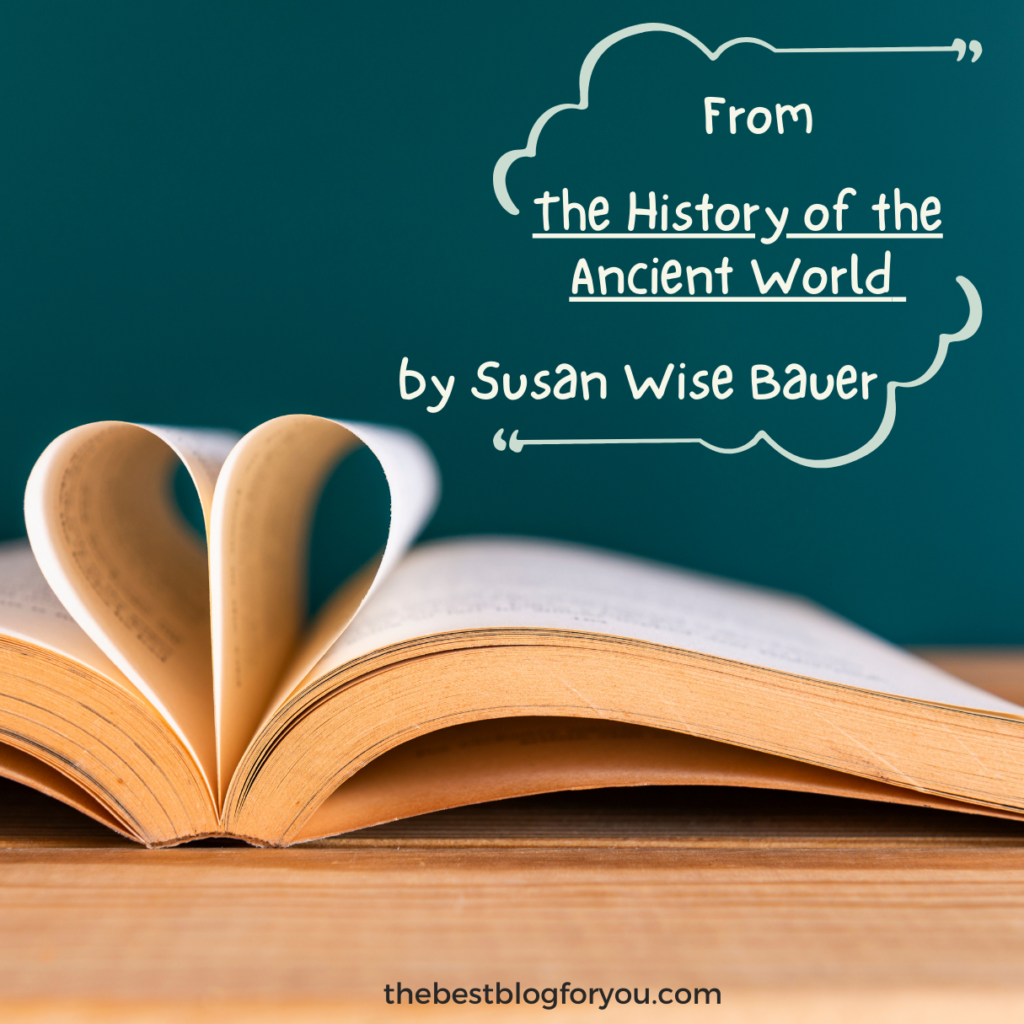
1. On the Beginnings of Civilization:
“The beginning of civilization is, more than anything else, the beginning of complexity.”
Bauer emphasizes that the dawn of civilization was marked not just by the formation of cities or the invention of writing, but by the complex social, political, and economic systems that emerged.
“The first cities were not built out of a desire for beauty, but out of necessity: a need to control resources, land, and people.”
This quote reflects the pragmatic origins of the earliest urban centers, which arose to manage resources and populations rather than for aesthetic purposes.
“Civilization begins with a leap of faith: the belief that life in a larger community will bring more security, not less.”
Bauer points out that the move from small, nomadic bands to larger, settled communities required a collective belief that living closely together would ultimately be beneficial.
2. On the Role of Leadership:
“History is shaped by great leaders, but also by the ambitions of the mediocre.”
Bauer highlights the dual nature of leadership in history, where both exceptional leaders and more ordinary, yet ambitious individuals have influenced the course of events.
“The story of ancient kings is often the story of a struggle to maintain control over land and people who had little loyalty beyond their immediate needs.”
This quote reflects the constant challenges ancient rulers faced in maintaining power, often having to contend with the basic survival instincts and shifting allegiances of their subjects.
“Great leaders are remembered not only for their triumphs but also for their failures, which are often more instructive.”
Bauer suggests that the lessons from the failures of historical figures can be just as valuable, if not more so, than those from their successes.
3. On War and Conflict:
“War is the great driver of history, pushing civilizations forward and pulling them apart.”
Bauer views war as a pivotal force in history, capable of both advancing civilizations and leading to their downfall.
“In ancient history, the boundaries of nations were drawn by the sword, but also by treaties, marriages, and trade.”
This quote acknowledges the multifaceted nature of how ancient boundaries and alliances were established, not solely through conflict but also through diplomacy and economic relationships.
“The constant cycle of conquest and rebellion is the engine of history; it is not stability but struggle that drives human progress.”
Bauer argues that the ongoing conflicts and power struggles throughout history have been key drivers of change and development.
4. On the Rise and Fall of Empires:
“Empires rise not because of the strength of their leaders, but because of the strength of their ideas.”
This quote emphasizes that the sustainability of empires depends more on the foundational ideas and systems they are built upon rather than solely on the charisma or prowess of individual rulers.
“The fall of an empire is rarely sudden; it is a slow unraveling, marked by loss of faith in the institutions that once sustained it.”
Bauer reflects on the gradual decline of empires, often stemming from internal weaknesses such as corruption, inefficiency, or loss of public confidence.
“Every empire carries within it the seeds of its own destruction, often sown by the very successes that once made it great.”
This quote captures the paradox of empires: their greatest strengths can become their greatest vulnerabilities, leading to eventual collapse.
5. On Cultural Exchange and Influence:
“No culture develops in isolation; every great civilization is a mosaic of borrowed and adapted influences.”
Bauer highlights the interconnectedness of ancient societies, where cultural exchange played a crucial role in shaping the identity and achievements of civilizations.
“Trade routes were not just conduits for goods, but also for ideas, technologies, and religions that transformed societies.”
This quote emphasizes the importance of trade in the spread of cultural and technological innovations, which had profound impacts on ancient civilizations.
“Cultural exchange often followed the paths of conquest, as conquerors and the conquered alike adapted and absorbed each other’s ways.”
Bauer points out that cultural exchange was not always voluntary; it often occurred in the context of conquest and colonization, leading to a blending of traditions and innovations.
6. On Religion and Mythology:
“Religion in the ancient world was less about personal belief and more about communal identity and social order.”
This quote suggests that ancient religions were integral to the social and political fabric of societies, serving to unite people and legitimize authority.
“Mythology is not just a collection of stories; it is a reflection of the values, fears, and aspirations of a culture.”
Bauer highlights the deeper significance of myths, which encapsulate the core beliefs and emotions of the societies that created them.
“The gods of ancient peoples were as much political as they were spiritual, often used to justify the power of kings and the order of society.”
This quote underscores how religion and politics were deeply intertwined in ancient times, with deities often serving to reinforce the legitimacy of rulers and the social hierarchy.
7. On the Power of Writing and Record-Keeping:
“Writing is not just the record of history; it is the tool that made history possible.”
Bauer emphasizes the transformative power of writing, which enabled the documentation of laws, transactions, and events, thus laying the groundwork for complex societies.
“The invention of writing allowed ancient rulers to project their power over vast distances, keeping control over lands they would never see.”
This quote reflects the role of writing in extending the reach of authority, making it possible for rulers to govern expansive territories.
“Written records offer us a glimpse into the minds of ancient peoples, revealing not just their actions but their thoughts, hopes, and fears.”
Bauer highlights the importance of written texts in understanding the human aspects of history, providing insight into the lives and motivations of people from the past.
8. On the Complexity of Ancient Societies:
“Ancient societies were not primitive or simplistic; they were complex, with intricate systems of governance, trade, and social structure.”
Bauer challenges the misconception that ancient societies were unsophisticated, emphasizing the complexity and organization that characterized these early civilizations.
“The achievements of ancient civilizations—from the pyramids to the Great Wall—are testaments to the ingenuity and perseverance of the human spirit.”
This quote celebrates the monumental accomplishments of ancient peoples, which continue to inspire awe and admiration for their creativity and determination.
“The story of ancient history is the story of human ambition, the desire to build, to conquer, and to leave a legacy.”
Bauer encapsulates the driving forces behind much of ancient history: the relentless pursuit of power, achievement, and remembrance.
9. On the Universal Themes of Human History:
“The struggles and triumphs of ancient peoples are not so different from our own; they remind us that the human story is one of perpetual striving.”
Bauer draws parallels between ancient and modern experiences, suggesting that the fundamental human drive to overcome challenges and achieve greatness remains constant.
“The patterns of history repeat because human nature remains unchanged; our desires, fears, and ambitions are the same as those of our ancestors.”
This quote reflects on the cyclical nature of history, driven by enduring human traits that have shaped societies across time.
“Ancient history is not a distant, irrelevant past; it is the foundation upon which our modern world is built.”
Bauer stresses the importance of understanding ancient history, as it provides context and insight into the origins of contemporary institutions, beliefs, and conflicts.
10. On Learning from the Past:
“The study of ancient history teaches us that no society is invincible; even the greatest empires are vulnerable to the forces of change.”
Bauer emphasizes the lessons of history, reminding us of the impermanence of power and the inevitability of change.
“History is not just a record of what happened; it is a guide to understanding why things happened and how we can avoid repeating past mistakes.”
This quote underscores the value of historical knowledge in making informed decisions and avoiding the pitfalls of those who came before us.
“To understand our place in the world, we must first understand the journey that brought us here, a journey that began in the ancient past.”
Bauer concludes with a call to appreciate the continuity of human history, encouraging readers to connect the dots between ancient beginnings and the present day.
